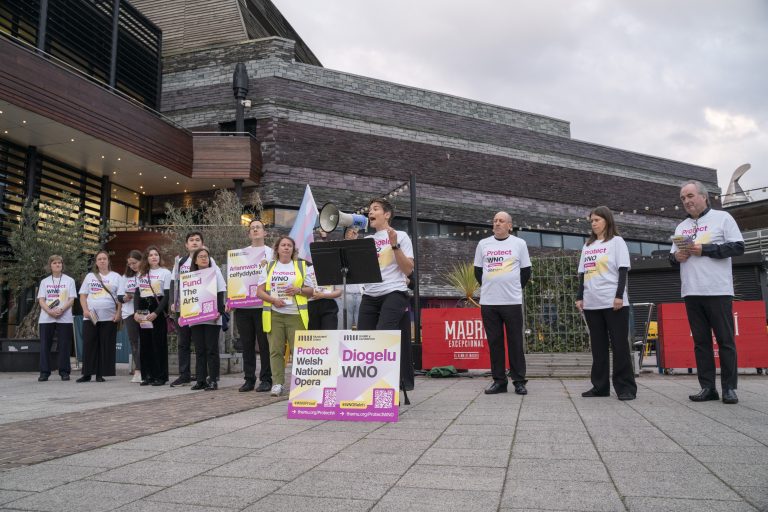Musicians from the Welsh National Opera (WNO) orchestra staged industrial action on Saturday, 21st September 2024, in a bid to address proposed pay cuts and secure the company’s future. Supported by the Musicians’ Union (MU), the action included leafleting the audience and wearing campaign t-shirts instead of their usual concert attire during the opening night of the opera Rigoletto.
The performance, directed by Adele Thomas, who will become Co-General Director and Co-CEO in January 2025, took place against a backdrop of rising concerns about the WNO’s financial sustainability. Musicians are calling for the management, alongside the Arts Council of Wales and Arts Council England, to maintain WNO as a full-time company, halt the proposed 15% pay cut, and agree on a sustainable funding package that includes provisions for touring.
The MU is actively lobbying the Welsh and UK Governments to intervene, emphasising the significant impact that management’s proposals could have on the cultural landscape and economy of Wales. This industrial action coincides with the recent announcement of an additional £1.5 million in funding from the Welsh Government to support arts organisations in the region. The MU is urging the Arts Council of Wales and WNO to ensure that these funds are used to protect full-time, employed, unionised jobs currently at risk.
Over 11,000 people have signed a petition initiated by the orchestra’s musicians to safeguard WNO. Their campaign has garnered support from members of the Senedd and TUC Cymru/Wales TUC. MU General Secretary Naomi Pohl commented on the situation, stating, “We welcome the acknowledgement of the funding crisis facing Welsh arts organisations and the need for further support to protect musicians’ jobs in Wales. It is encouraging that the voices of our members and all those who support WNO are being heard.”
Pohl further noted the profound consequences that the proposed changes could have on Welsh culture, stressing the limited opportunities for live opera in Wales and the South West of England. She remarked, “There are very few opportunities to see live opera in Wales, and the WNO management’s proposals will mean some areas will have no provision at all.”
Andy Warnock, MU Regional Organiser for Wales and South West England, highlighted the longstanding financial support that WNO has received from both Arts Councils, stating, “This is a massive backwards step for equal access to the arts across the UK.” Warnock urged the Wales and UK Governments to act swiftly to provide the necessary support to protect WNO as a national cultural asset.
Jo Laverty, MU National Organiser for Orchestras, expressed discontent with the trend of opera orchestras being pushed into part-time employment. She reiterated the need for stable and secure employment, asserting that musicians are facing tough financial decisions as their salaries are rolled back to levels not seen for five years.
As the situation unfolds, the MU and WNO musicians remain resolute in their fight to secure a sustainable future for the orchestra and ensure that Wales continues to be a vibrant hub for live music and opera.


